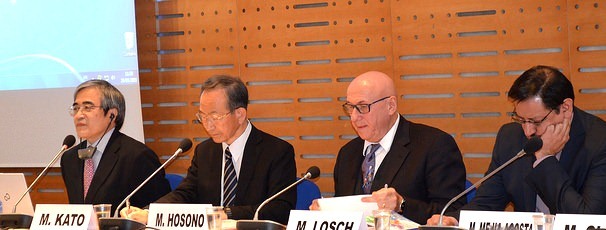Quality of Growth for the 21st Century: JICA-RI Holds an Open Seminar with AFD and IDS
2015.02.06
Throughout the 20th Century right up until today, “growth” has been considered as economic growth. Its objectives have been considered as being an increase and expansion in the scale of economic activity, and its progress has been measured by GDP. However, as signs of the widening disparity both between countries and within countries, and the negative impact of global climate change are all becoming evident, societies have a choice, either reframe their definition of growth, or try to pursue it as we have known it for many decades. The concept of “Quality of growth” is now a topic of debate among policy makers and the academic world, as we search for “growth for the 21st century.”
With this in mind, JICA-RI has been conducting joint research on the “quality of growth” since 2012 in collaboration with the French Development Agency (AFD) and the Institute of Development Studies (IDS) at the University of Sussex. The research aims to academically seek a desirable development model and growth in the 21st century by trying to answer a number of questions: What are the dimensions of growth quality we should care most about? How to measure such qualities? What are the tradeoffs between growth and those dimensions in the context of different policy regimes and governance structures? The outcome of the research was published in a report, a collection of papers that represents the effort of researchers from the three institutions: AFD, IDS, and JICA. From JICA-RI, Vice President Hiroshi Kato, Senior Research Advisor Akio Hosono, Senior Research Fellow Go Shimada, Kamal Lamichhane, Associate Professor of the Center for Research on International Cooperation in Educational Development (CRICED) at the University of Tsukuba (JICA-RI Visiting Scholar), and Ippei Tsuruga, Representative of the JICA USA Office (former Assistant Division Chief of JICA-RI Research Program Division) have all contributed papers. The event to launch the report was held at the Paris headquarters of AFD with 70 participants including representatives of AFD, the French Ministry of Foreign Affairs, and the OECD.
JICA President Akihiko Tanaka, AFD CEO Anne Paugam, and IDS Director Melissa Leach, as well as the five authors of the report who contributed to the research activities participated as panelists. In the opening session, Tanaka touched on JICA’s view that quality growth will be achieved only when it is “inclusive,” “resilient,” and “environmentally sustainable,” while talking about JICA’s specific past initiatives and on-going revisions of the development cooperation framework by the Japanese government. CEO Anne Paugam of AFD underlined the importance of an international response to climate change and consideration of its social and environmental impacts and referenced COP21, which will be held in Paris in December 2015. Furthermore, Professor Leach, Director of IDS, emphasized the fact that “quality of growth,” including reducing inequality, promoting environmental sustainability, and striving for inclusiveness, is consistent with the strategies of IDS.

At the seminar
Subsequently, the authors presented the outcomes of their research. The issues discussed included the projection that targets for poverty reduction will not be achieved at the current rates of growth, analytical frameworks to measure growth, and the direction that “quality of growth” should take in the future among others. In the roundtable session titled “Desirable Trajectories for Quality Growth” with Kato as the moderator, Hosono presented examples of JICA’s technical cooperation in Chile and Thailand. Hosono explained that industrial transformation which included the attributes of being balanced, inclusive, sustainable, innovative and secure, should be fully taken into account in order to realize “quality of growth.”
In a series of discussions, participants shared the understanding that policies and approaches toward ensuring “quality of growth” should be considered in the context of the challenges that each country faces. In addition, in the process of pursuing “quality of growth”, it is essential to take a cross-sectoral approach among government organizations, research institutes, and private corporations. Kato concluded that it is important for development agencies such as JICA and AFD to encourage recipient countries to take ownership of their policymaking and implementation.

事業事前評価表(地球規模課題対応国際科学技術協力(SATREPS)).国際協力機構 地球環境部 . 防災第一チーム. 1.案件名.国 名: フィリピン共和国.

事業事前評価表(地球規模課題対応国際科学技術協力(SATREPS)).国際協力機構 地球環境部 . 防災第一チーム. 1.案件名.国 名: フィリピン共和国.

事業事前評価表(地球規模課題対応国際科学技術協力(SATREPS)).国際協力機構 地球環境部 . 防災第一チーム. 1.案件名.国 名: フィリピン共和国.

事業事前評価表(地球規模課題対応国際科学技術協力(SATREPS)).国際協力機構 地球環境部 . 防災第一チーム. 1.案件名.国 名: フィリピン共和国.

事業事前評価表(地球規模課題対応国際科学技術協力(SATREPS)).国際協力機構 地球環境部 . 防災第一チーム. 1.案件名.国 名: フィリピン共和国.